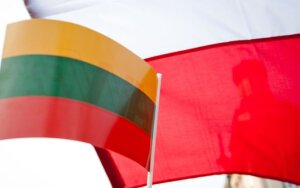- September 21, 2012
- 500
The youth from Poland and Lithuania: the tolerance is not innate, it has to be learnt.

The project ‘Different faces- one soul’ (‘Skirtingi veidai – viena siela’) has ended. Within the framework of this project, the youth from Poland and Lithuania was discussing the human rights, the problem of discrimination and the conflicts in the society.
12 participants of the project sought answers to their questions by creating photographic collages and looking for similarities between the two cultures. The majority of participants admitted that tolerance is not something obvious and we need to learn it. The project was organised by the Lithuanian Youth Centre (Lietuvos jaunimo centras) in cooperation with the Polish- Lithuanian Youth Exchange Fund.
Natalia Tomaszewska, one of the participants is convinced that we should talk more: ‘In my opinion, we need to talk more about the problems connected with tolerance, the differences between the nations and about the sexuality as well. If we negate the existence of the differences and will not discuss them, we will not realize how intolerant we are towards each other.’- says Natalia.
Monika Kiburytė agrees with Natalia. During the six days of the project, she realized that people hardly ever think about the consequences of their actions. ‘I realized that the society often claims to be tolerant but it is just a cover.’- claims Monika.
The youth visited the community of Poles, Jews and Belarusians. One of the main aims of the project was to show that tolerance is not innate and to become a tolerant person we need to distinguish and fight the stereotypes. It was possible thanks to the bond that was developed during the discussions and completing numerous tasks. ‘Only when we stand face to face with people abandoned by the society we realize that they are the same- they have their own goals and dreams. That’s when you start to respect and understand them.’- says Sonata Juciūtė, one of the participants.
The project focused not only on searching for similarities between the two cultures but also on discussing different forms of discrimination- on the grounds of financial situation, sex or sexual orientation. The last topic was broadly discussed.
‘If we live in a free and democratic country we hardly ever notice people that are forced to live on the margins of the society because of a different sexual orientation. The project showed that in the field of human rights we can do a lot on our own. We realized how much our world needs tolerance. Certainly, it all depends on our willingness to plumb the depths of our problems.’- explains Paulina Deja.
At the end of the exchange the youth looked for similarities between the two cultures. They took pictures of characteristic places in Vilnius. The pictures were used to create collages which are now displayed in the Lithuanian Youth Centre. The organizers expressed their hope that this project will unite the two countries and be a beginning of a wonderful tradition. The Lithuanian Youth Centre has been organising such projects for 2 years.
Tłumaczenie Kamila Jędrzejewska w ramach praktyk w Europejskiej Fundacji Praw Człowieka, www.efhr.eu. Translated by Kamila Jędrzejewska the framework of a traineeship programme of the European Foundation of Human Rights, www.efhr.eu.

